

Korea
U.S.A.
Vietnam
Hong Kong

International students of the School of Global Japanese Studies' English Track from Korea, the U.S.A., Hong Kong and Vietnam talk about their life at Meiji University in Japan.
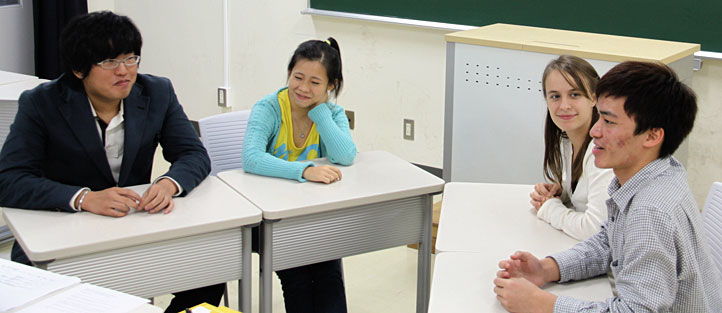
- Why did you choose Japan to study abroad?
- Why did you choose the English Track course at the Meiji School of Global Japanese Studies?
- Please tell us specifically what you are currently studying, and what you have experienced so far.
- Everyone is currently enrolled in English courses, and is taking lessons that are in English.
But is there anything that you find inconvenient when trying to use Japanese language in society here? - How are you currently studying Japanese?
- In the future, what field or discipline do you want to work in?
- What would you say to potential students who want to enrol in the School of Global Japanese Studies?

"Research and education proposed by the School of Global Japanese Studies covers Japanese culture in a broader sense. It includes not only contemporary and traditional Japanese culture as a whole, but also the cultures of business, industry and society at large." In addition, we focus our energy on intensive English language and global education that prepares students to properly understand different cultures, with the aim of fostering "real" cosmopolitans who can look at Japan from a global standpoint and actively introduce Japanese culture to the rest of the world.
The School of Global Japanese Studies, started a new English-based program, English Track, in spring 2011. In this program, students can earn all the credits of the SGJS in English and obtain a Bachelor of Arts degree in 4 years.
The program features a curriculum that concentrates on traditional and modern Japanese culture, as well as Japanese society in the global community, all of which are currently attracting worldwide attention under the government's 'Cool Japan' campaign.
The school also provides total support for students' careers in Japan or in Japan-related fields. They will have opportunities to learn Japanese as a second language, which will be included in the credits necessary for graduation. They will also have hands-on experience in the real world through participating in workshops, extracurricular activities and internships.
As of November 2011, The School of Global Japanese Studies has 214 international students from all over the world.
For more details:
・The School of Global Japanese Studies
http://www.meiji.ac.jp/nippon/english/
・The School of Global Japanese Studies English Track
http://www.meiji.ac.jp/nippon/english/englishtrack/

1 Why did you choose Japan to study abroad?

Bernie
For me, actually I’m a baseball fan, so in terms of baseball, definitely either America or Japan. In my opinion, Japan’s baseball is more interesting. I played baseball for 10 years in Hong Kong, although I know that sounds a bit weird, “baseball in Hong Kong”. I want to understand more about Japanese culture, and the first step I felt would be through baseball. From there, I was thinking I could learn about pop culture, manga, different angles and aspects. This is why I chose this program in Japan. I am now studying manga culture and the fashion of Japan. These two subjects really interest me. I thoroughly enjoy the lessons, not just because they are an introduction to the subjects, but because the teacher also compares different cultures and styles around the world. Through these comparisons I am learning more about Japan and the world. This gives me a global as well as local perspective of Japan.
Oanh
For me, I’m interested in Japanese trade because the economy of Japan is really unique. And now with the Japanese yen being so strong, I thought it was a good opportunity to study in Japan and then work here. I chose Global Japanese Studies as it is a subject I really want to study.
Devyn
I chose Japan because it was different and challenging. The city where I grew up has a Japanese sister city, up north, and my teacher would go there every year and come back with all sorts of shiny things, like beautiful red silk. That really piqued my interest. Then as I grew older, I started to realize how much of Japan was in my own world, in my life. And in high school I had an option to choose French, Spanish or Japanese as a foreign language. I chose to challenge myself and study Japanese. While studying the language, we were also required to study the culture. I already knew quite a lot about the culture, as there was a lot of anime and manga present in American culture, and also because of what my teacher brought back. The more I studied Japanese language and culture, the more I fell in love with it. By the time I graduated from high school, I felt my 3 years of Japanese language study was a lot to waste. So there was no other option for me but to continue my studies in Japan.
Jihoon
First of all, I planned to study in the United States, but due to some personal reasons I came to study at Meiji. Although I had planned to go to the United States and didn’t get into the college I wanted to, something good still happened—that was Meiji University. Meiji wanted to give me an opportunity. It was the only Japanese university I applied for and luckily I got in. Japanese and contemporary culture in my country is also influenced a lot by manga and the influential history of Korea and Japan. It all happened very suddenly: it was a great opportunity and I took it.
2 Why did you choose the English Track course at the Meiji School of Global
Japanese Studies?
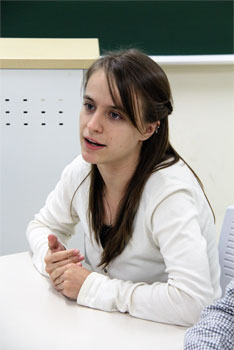
Devyn
The Japanese language is a little complicated in that it borrows a lot from Chinese in the kanji. If you’re going to be taking college level courses, you’re going to need to be fluent in kanji. To be fluent in Japanese, you need to be able to read between 5,000 and 6,000 kanji. After 4 years of studying in America, I can only read about 300. I didn’t want the fact that I wouldn’t be able to study at all to stop me from my dream of living in Japan. So choosing the English Track was very good.
Bernie
As I’m Chinese, kanji is no problem for me. There were two reasons that I applied to English Track. The first was that when studying at community college in Hong Kong, it was Meiji that was the first Japanese college to introduce themselves and their English Track. It looked like a short cut to my dream place to study. When I was at community college, I looked into studying in Japan and reviewed the test papers. For me, having studied Japanese for 4 years, I still didn’t have the confidence to pass that kind of exam to get into college in Japan. English Track definitely was a short cut and it makes me enjoy learning Japanese, rather than using Japanese as a tool to build my future. The second reason is that when studying in English Track, the teachers use English to teach us. This means there will be some foreign teachers and also Japanese teachers who have experience travelling and studying abroad. So they have very different points of view, which is interesting for us.
Jihoon
I learned from my father about the English Track program. I was looking for a different college at the time, in Korea or other places. However, Korea wasn’t really an option, nor was the U.S., due to some visa complications. English Track was an opportunity for me.
Oanh
My Japanese wasn’t good enough, but my Japanese school had a connection with Meiji and they introduced me to the English Track program. That’s why I chose English Track.
3 Please tell us specifically what you are currently studying, and what you have
experienced so far.
Bernie
The cultural festival of Meiji (Meidaisai) just ended last week—that was a unique experience for me. We don’t have things like that in Hong Kong. Every student participates, every team or club has their own shop or gallery, and everyone enjoys it. That experience, I think, was the most interesting one I’ve had. I’m a member of the International Student Committee, and they had a photo gallery in the media building. I helped them run the gallery the whole time. I also participated in different events, such as one that gave me the chance to wear kimono. I wore a man’s kimono, which was fun.
Oanh
I’m impressed by the social circles in Japanese universities. We have circles in my country, but they are not that strong and don’t often work together. Here, the circles get together. They have a "nomikai" (drinking party) and other events, which are really fun.
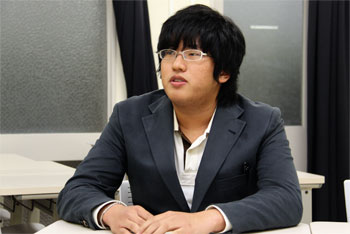
Jihoon
Last week I went to a volunteer service. I try to experience different things in Japan. I went to Tohoku to volunteer and travelled to various places seeing different aspects of the culture. It’s a big world to me. Every week I travel around Tokyo and to places like Osaka. Outside of campus I try to do a lot of things and this helps me reflect on life.
Devyn
Probably the best thing I have done so far is a sort of home stay. When I went to Osaka to visit a friend, her parents took me in. They dressed me in kimono and took me to a temple to take pictures together. They also took me to an onsen (hot spring resort). The Japanese hospitality and enthusiasm to meet foreigners and speak English was fabulous to experience. As for the classes that we’re taking, Meiji encourages us to take a full load, which is about 20 credits. As for me, I’m taking General Japanese, which is reading, writing and speaking Japanese. On top of that, we’re taking Japanese Social Systems, International History, Global Japanese Studies which is our major, Manga Culture, Cross-Cultural Education, Cultural History of Fashion and Anime Culture.
4 Everyone is currently enrolled in English courses, and is taking lessons that
are in English. But is there anything that you find inconvenient when trying
to use Japanese language in society here?
Devyn
The hardest thing I encountered was trying to rent an apartment. Unfortunately, a lot of landlords don’t want foreigners who can’t speak fluent Japanese. This limits the amount of apartments available. Other problems I encountered were when I went to get a cell phone and a credit card—there were no explanations in English. You basically have to have a Japanese friend help you.
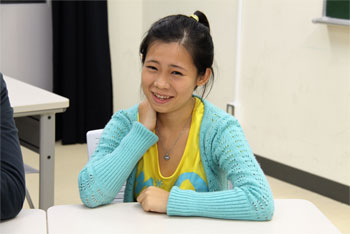
Oanh
I did a homestay for 3 months and didn’t have any difficulty living here because of what my host family taught me.
Jihoon
The electric bills, housing fees and how to ask directions are some examples. These things require a degree of fluency in Japanese. I am learning how to be independent because this is my first time studying abroad without my family’s support. Paying the bills can sometimes be confusing.
Bernie
Luckily, I’m living in a dormitory and the dormitory company helps me solve problems like arranging payment of bills. The only thing I find difficult is throwing away rubbish. In Hong Kong, we simply throw away whatever is rubbish. Here we have to do things like remove the caps from bottles, remove the paper parts of things, separate trash for recycling. I think though that the level of English comprehension has improved a lot though in Japan since the old days. It’s becoming easier and easier to get around using English.
Meiji has a school office that cooperates with the International Student Committee. Every foreign student has a campus mate who helps them get used to life in Japan and to deal with any problems they might have. They really helped me a lot when I first came to Japan.
5 How are you currently studying Japanese?
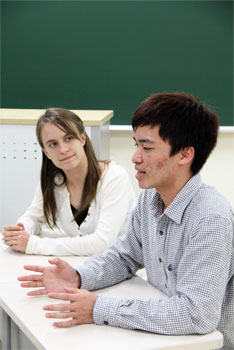
Devyn
Last semester we had a class that was part of the writing class where they taught us kanji. Our current class is a little different. We have a book that is only in kanji and so we need an electric dictionary to help us through it. It’s a sink or swim situation. We have been here for 7 months and our Japanese has improved incredibly. I think we can all communicate our basic needs and get around. We all gave it our best shot from the beginning. There are many international students who don’t have English as their first language, so we also have to communicate in Japanese with them.
Jihoon
When I first arrived, everyone spoke to me in Japanese and it was a little confusing. It took time and a lot of practice. I go home and study the kanji I don’t know on the internet. I do a lot of cultural studies, but most of the time I’m focusing on my Japanese. I need to keep pace with my classmates.
Bernie
Hanging out with Japanese friends, at first we tried to communicate in Japanese and our conversations were 10% Japanese. Now they’re about 60% in Japanese. I am becoming more and more fluent. Hanging out with Japanese students lets me learn a lot from listening to them. It helps me get used to the speed of speaking.
Oanh
I have some trouble focusing sometimes when people talk with me. Sometimes I can’t understand them. I sometimes ask people politely to repeat themselves so I can better understand.
6 In the future, what field or discipline do you want to work in?
Jihoon
I used to dream of becoming a professor in the United States, but this won’t happen now. So I am looking for something in Japan. Overall, my goals include improving my Japanese and getting used to Japanese society. Second, it’s finding my dream—that’s what college is for after all.
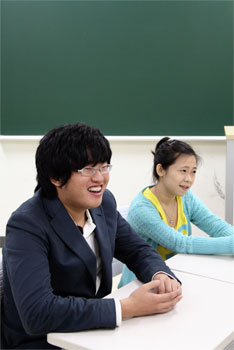
Oanh
My dream is to open a restaurant in France. To make that dream come true I have to earn a lot of money. I needed to come to Japan to do business and earn money to do this.
Bernie
I love drama and musicals. I’ve been interested in them for a while. After I graduate from Meiji, I want a career in the cultural field, especially in Hong Kong. I want to define the culture of Hong Kong, so in the future even the government will fund our cultural endeavours. I also have a great interest in film.
Devyn
For me, coming to Japan was my dream. It took me 5 years to get here. As far as careers go, when I got here, I started teaching English and I love it. I don’t like teaching English specifically, but I love teaching in general.
7 What would you say to potential students who want to enrol in the School
of Global Japanese Studies?
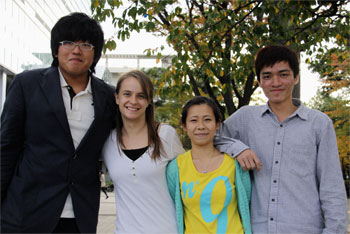
Jihoon
In the school motto, it says in Japanese, ‘Rights, Liberty, Independence and Self-Governance’. These characteristics are the most important at Meiji University. I have to be independent; I have to personify self-governance. I came from a very small private high school that was expensive. They didn’t give us much of an education compared to what Meiji gives us. I have experienced every aspect of the school motto.
Devyn
Just go for it. Especially if it’s something you dream about. But really pause and think: this is a 4-year commitment in a place where you have to be really independent. We were very lucky because our group started off small, so we could support each other. At the same time, there are language and cultural barriers that will make you feel isolated for a while, especially for 4 years. Or at least until you learn how to break through those barriers. Just remember you are making a commitment to a place that’s really fabulous and warm once you get used to it. Make friends, talk to your teachers, and enjoy Tokyo as a multicultural place where you’ll meet students from around the world.
Bernie
I would tell future students to ask questions right up to the last minute of their lessons and to learn new things up to the last seconds of their life, as my teacher taught me. Hong Kong people, maybe Asians in general, are shy. We are taught to be quiet in the classroom, rather than participate in class. It makes us shy to ask questions. I want to tell students, because of the language barriers, to ask questions—the teacher will help you. And if you ask, you will get further ahead.
Oanh
I think that you should enjoy university life, but don’t spend so much time hanging out. Spend more time studying.

The School of Global Japanese Studies concluded a Memorandum with Florida State University (FSU) in September 2008 for a Study Abroad program which includes an internship at Walt Disney World in Florida, USA. After a one-week intensive course at the FSU School of Communication, the participating students take courses in business management principles and hospitality from Disney employees while working as “casts” in Walt Disney World hotels and restaurants in a variety of guest service positions for 30 to 40 hours a week for a period of six months.
11 students participated in the first internship in FY2010, and in FY2011 there were 27 participants. They all returned to Japan with greatly increased hospitality and communication skills.
International students enrolled in the School of Global Japanese Studies are also eligible to participate in this program.
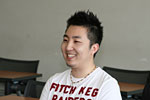
Mr. Seo Yeonho
Suwon, Korea
I studied at an English language school and Community College in Canada and attended Japanese language school in Japan before enrolling in the School of Global Japanese Studies. Indeed, it was this program that inspired me to choose Meiji University over other institutions. I did my internship, working as a concierge in the Animal Kingdom Lodge at Walt Disney World.
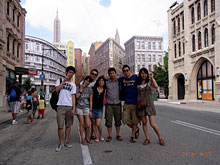
The position of concierge is required to know everything about Walt Disney World and to provide that information to the guests. Even among the local staff, the position is usually given to experienced employees. Before leaving for America, Mr. Seo had very little interest in Disney and had never even been to Tokyo Disney Resort. He says that, during the first few weeks, to make up for the additional problem of language, he spent many long hours studying after work.
Disney guests can be very hard on the “casts,” and casts who lack confidence in themselves can never gain the trust of the guests. Mr. Seo made every effort under these rigorous circumstances to provide the kind of customer service that only he could bring to the guests during the six-month period. His efforts were rewarded when he received a letter, addressed personally to him, from an elderly couple who had consulted him as a concierge, thanking him for the special service he had given them.
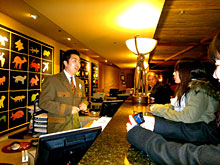
The Disney mission is for the casts to provide the guests with magical moments. Mr. Seo feels, however, that it was a workplace where casts also receive a great deal of happiness from the guests.
“Living and working not only with the local staff but also those who came from around the world, as well as serving guests who come from all over the world, provided me with the opportunity to gain a deeper understanding of other cultures and widen my own personal horizon. I realized how invaluable an experience this was, once I returned to Japan.”
“In the future, he hopes to use the experience he gained on this internship to engage in work relating to the development of third world countries like Africa.”
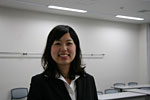
Ms. Yuka Okita
Tokyo, Japan
I have been studying English very hard ever since I was in high school because I felt that if I could speak English, I could communicate with an even greater number of people from other countries. My goal was to study in an English-speaking country.

The reason I chose the Walt Disney World Internship Study Abroad Program was because, unlike other programs, it offered the unique opportunity to make contact not only with other students but also with many foreigners from differing backgrounds and from a wide age range. The chance to learn the best hospitality in the world at Walt Disney World was also very attractive.
My internship included three months as a guide in the theater–style attraction “Captain EO” and “Journey into Imagination” in a theme park named the EPCOT, and another three months in a fast-service restaurant named “Electric Umbrella.”
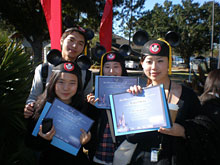
In the first few months, I had an especially tough time with English. In the theater-style attraction, one of my jobs was to explain the show to the guests. I even had a local guest said, “I can’t understand what she’s saying at all; replace her with someone else!” I also had difficulty communicating with the other (mostly American) staff. If I didn’t speak to them myself, they would not attempt to speak to me.
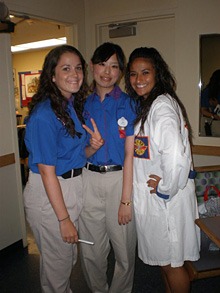
In such a situation I decided that I would make the effort to introduce myself to people I meet for the first time, and make an effort to expand personal connections myself. One day, I introduced myself to 40 people. I also made sure not to rely too much on other Japanese participants in the same program. At first, I was living with Japanese roommates, but one month after arriving in America, I began living with a British, an Ecuadorian, and a Russian roommate.
As a result of trying to get the most out of the short six months that I had, I was able to build good personal relationships and spent my days off, going to the nearby beach or other theme parks with my workmates and roommates. I still keep in touch with them, now that I am back in Japan.
My six-month stay was extremely stimulating, with new encounters and new discoveries every single day. After completing this program, I have gained confidence that I can take up any challenge without being afraid, as long as I did my best.













